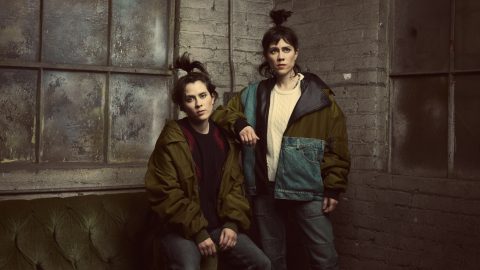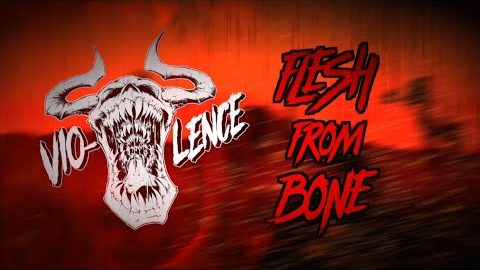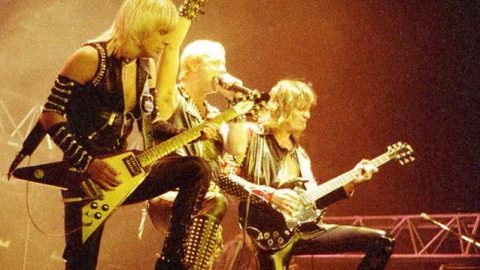NME Music News, Reviews, Videos, Galleries, Tickets and Blogs | NME.COM

Michael Sheen would just like some bloody toast, please. In the new video for techno-pop producer Kelly Lee Owens’ ‘Corner Of My Sky’, the Welsh actor is seen grappling with a mischievous toaster. He puts the bread in, but the toast doesn’t come out – repeat ad infinitum. At one point, he even invites the delivery man to take a peek at the dimension-defying kitchenware. An existential crisis beckons.
In the video’s final third, however, we see where the transporting toaster has dropped his bread: in soggy car parks, lush hillsides, dilapidated rooftops and on a dramatic shoreline, where Owens strides with a mysterious grin. It doesn’t make a huge amount of sense, but perhaps that’s the point. The clip rings true with many experiences of lockdown this year: we’re all house-bound, slightly paranoid and paying close attention to our immediate surroundings. Was that just a creak in the loft? Have my house keys and mask dissolved into the ether? Wait, has anyone seen my toast?
Owens laughs at NME’s interpretation and fair enough, we suppose – it’s a pretty uptight reading. Hers is far more life-affirming. “We wanted to capture the mundanity and repetitiveness of this domestic living, but also this was kind of a wake-up to not forget the magic in the everyday,” she says on Zoom from her home in London. “Coming from Wales and coming from the myths, the stories and the legends, I genuinely feel the magic around me at all times and it is in the mundane and the stuff we take for granted. Why can’t a toaster be a portal of some kind?”

Well, quite. But the video is of further importance to Owens. The song features the iconic drawl of Welshman and Velvet Underground co-founder John Cale, who blesses the falling of the rain and “the foxes creaking in their lairs” while droning beats slither around his vocals. Cale is New York-based and couldn’t make the shoot, so she roped in Newport-born actor Michael Sheen to complete this cross-generational trio of Welsh creatives.
“I don’t want to say that it’s the past, present and future of Wales, because that puts John in the past, but I’m always interested in connections, and those with elders especially,” the 32-year-old says. “The stories they have to tell us and the things they have to teach us and what we can teach them also. Wales has suffered and been through a lot [including the oppression of the Welsh language] and I want to talk about that and be real about that in my work.”

Her second album, ‘Inner Song’, is a staggering listen and “one of the most beautiful records of the year”, according to a five-star review from NME’s Ben Jolley. Written and recorded in a short period last year in her native Welsh countryside last year, its initial release date was announced in February, before the pandemic had truly taken hold. Yet the themes on the album are eerily resonant. Tales of loss and grief are represented in every sense, be it in a relationship breaking down (‘On’), the loss of a family member (‘Jeanette’) or the climate crisis (‘Melt!’). All of this is soundtracked by banging techno-pop, the kind that would lend itself to echoing festival tents (‘Night’) and gazing into the night sky on the comedown (‘Flow’). Its most memorable characteristic is that of resilience, and the idea one should continually move forward in the face of such change.
The connection to her Welsh homeland is one that Owens feels deeply. So much so that mid-interview Owens asks if she could hijack the chat and recite the Welsh national anthem to NME. It’d be our pleasure, Kelly. In comparison to England’s ‘God Save The Queen’, she says, ‘Hen Wlad Fy Nhadau’ (‘Old Land of My Fathers’) is a song dedicated not just to the land and language, but to the creativity that arises from it: poets, playwrights, singers and performers.
“I come from a place that is full of fighters who have been through a lot”
Understanding her history and staying true to those ideals is crucial. Or, as Owens puts it, quoting poet Brian Harris’ poem “In Passing”: “To be born Welsh is to be born privileged / Not with a silver spoon in your mouth / But music in your heart and poetry in your soul.”
She adds: “I come from a place that is full of fighters and really tough people who have been through a lot. There’s magic there, but it’s complicated. I have a deep connection with it now but I’m still only just discovering the story of where I come from and it’s not all pretty and not all poetic, but being someone who is unafraid of that is the journey that I think is necessary to go.
“We’ve always understood what the land gives us. Anyone who stands next to a mountainous area feels small but in the most humbling beautiful way. I think we need to be reminded that we are not bigger than ‘it’.”
There’s little wonder, then, that she, Sheen and Cale can find the wonder in the everyday – even in a pesky toaster.

Kelly Lee Owens grew up, in her own words, as a typical “Virgo loner” in Flintshire on the north coast of Wales. She’d find comfort and joy in the musical world as opposed to “smoking on a wet pavement” with friends. In her bedroom, she’d play CDs and sing her own melodies atop, and came to master the bass, drums and more. Radiohead, The Cocteau Twins and New Order are key influences and she lauds their abilities to embrace melancholy but never abandon the rave.
Owens’ unflinching approach to empathy and inquisition has manifested itself in all parts of her career. At one point, she worked as an auxiliary nurse in a cancer ward, lending a helping hand to patients close to the end. She doesn’t consider death a taboo – she wants people to be educated in the complex emotions of mortality and grief in the same way that life is supported at birth. In the past year, more than 42,000 people are expected to have died from COVID-19 or associated illnesses.
“There’s trauma in knowing there’s a sense of isolation in death,” she says. “Something I’m interested in, and seems to come naturally, is supporting someone through the last moments of their lives. When my Nan died, she was being held and I was talking to her through this moment. A family friend recently passed and I recorded voice notes to play to him as he passed. There’s huge fear and stigma around death, but we need to think about this more in general to support people through these times so it’s less traumatic.”
“Healthcare professionals have died and some of those deaths could have been preventable”
She’s incandescent with rage about how her former healthcare colleagues are being treated by the Government during the pandemic. The struggle for frontline medical staff to acquire adequate PPE (Personal Protection Equipment) has been well reported and hundreds are thought to have died treating patients with the virus: “The rhetoric from the Government is something I have a real problem with. They keep calling them ‘our heroes’, as in war heroes, like they’re being sent to slaughter. Healthcare professionals have died and I think some of those deaths could have been preventable.”
Owens’ music career began with a stint as the bassist in briefly hyped indie quintet The History of Apple Pie in the early 2010s. While she didn’t feel particularly aligned with the music they made, she picked up lessons and pals along the way. She befriended Blur guitarist Graham Coxon during this time, who also gifted her a Fender Mustang Bass to tour with. “He supported me through the ups and downs of being in a band with other people and other egos,” she laughs. “It was good for a time, but I wasn’t writing the music and I wasn’t creatively fulfilled, so I knew that this would be a stepping stone. I was always excited about going into my own world.”
Working at London record shops, including Holloway’s Pure Groove and Soho’s Sister Ray, brought her into the world of electronic music, something she’d always been intrigued by. She grafted in the stores alongside emerging musicians such as the producers Daniel Avery and James Greenwood, as well as bumping into established names such as Erol Alkan and late ‘Screamadelica’ producer and DJ Andrew Weatherall. Her hypnotic vocals are peppered through Avery’s mammoth 2013 record ‘Drone Logic’ and she has collaborated with Greenwood on both of her studio albums.

Owens also amassed nuggets of information to avoid getting screwed over as an emerging musician, and an independent mindset remains. She would press and sell the vinyls of early releases and until recently continued to work as a record shop employee. Her 2017 self-titled debut album was released on Norwegian indie label Smalltown Supersound, but the current pandemic and its punishing impact on independent musicians has made Owens reassess her journey.
“If I was in the position I was in two years ago around my first album, I’d have to have found another job,” she says. “I would have had to have thought a lot harder about how I was going to manage financially. I come from a working-class background in a small village in Wales and I worked for every cent – that work ethic instilled in me is very strong and I’m grateful for that.”
Owens has had to analyse her current set-up, though. She says that up to 70 per cent of her income is generated by merchandise sales and live performances at festivals and venues worldwide. Looking ahead, she’s open to the idea of socially distanced raves, providing that all safety precautions are met, but the downtime has made many in the industry rethink the balance of income for artists.
“I felt like I was channelling a part of Keith Flint when I was writing the lyrics to ‘On’”
“The fundamental structures need dismantling,” she says. “The big corporations in the music industry are the only places with money and they’re going to have to take responsibility, because there’s a whole chain of people – like lighting operators, sound engineers and venues – struggling as well as the artists. I think it will get to the point where artists, consumers and fans demand some kind of change.
“We have to look fundamentally at the systems that we engage in, which, frankly, isn’t very fair to artists. Kanye West can be sometimes problematic, but it’s been interesting what he’s been tweeting recently about that transparency of his record contracts. How are we going to support artists if live shows remain off for a considerable amount of time?”
Owens is grateful that she had the experience to recognise a bad record deal when she saw one, and hopes that by being transparent about her situation that it might help future artists: “On the inside I am changing things for myself, and I want to talk about that because it is possible for others. All we’re asking for is things to be fair. No one is asking for more than they deserve, so why is that not OK? Why hasn’t that been changed?”

‘Inner Song’ is a particularly potent album for 2020 for reasons beyond Kelly Lee Owens’ control. The album was originally slated for a May release, but she held it back to see how the next few months panned out and, crucially, to help support the type of record shops that she used to work in. By the time the record was released in August, some record shops were able to operate and sell her album.
The record explores our connection and behaviour towards the natural world and the accelerating climate crisis. Initial reports suggested that a reduction in air and car travel domestically and internationally had led to a substantial drop in carbon emissions, but it’s now considered that lockdown has had a negligible impact on halting global warming. During these isolated periods, green spaces have nurtured healing emotions for some, while others reconsider the value of outdoor space.
Owens warns that reflection should have come sooner. Take ‘Melt!’, the album’s punchiest track, in which she offers a reminder that the ice on the planet’s coldest environments is melting “as you sleep” and “while we breathe”. Samples of ice skaters and glaciers collapsing feature throughout, the sharp sounds highlighting an ecosystem crying out for help.
“With climate change, I do feel like nature is speaking to us very directly,” Owens says. “Nature is communicating to us that something is wrong and that communication is beautiful, but also terrifying.”

The process of loss and grief is another complex emotion that humans have had to come to terms with on the mass scale – be it in the alteration to our daily lives and routines, a potential economic wipe-out for jobs or the sheer number of deaths from the virus in the UK. Death continues to linger, but the tools to process them aren’t always available.
Owens first explored her journey to emotional clarity on the debut album highlight ‘Arthur’, a tribute to the famed New York cellist Arthur Russell, where field recordings meet her layered harmonies and an orchestral swell. Then there’s that album’s meditative ‘Keep Walking’, in which she implores us to stay strong in the face of adversity. The two-word mantra she serenely chants – “keep walking” – may not seem particularly revolutionary, but if it catches you at the right moment, the suggestion that one can continually move forward is sometimes enough.
‘Inner Song’ continually pulls apart the breakthrough emotions that come after the overwhelming feeling of loss. The song ‘On’ was penned on the day news broke that Prodigy vocalist Keith Flint had died by suicide, prompting the working title ‘Spirit Of Keith’. She sings contemplatively of getting her “head and heart in unison” as the pounding second half catapults the song into the unknown, which is embodied by an otherworldly synth line.
“I genuinely felt like I was channelling a part of Keith Flint when I was writing the lyrics to that song and I asked to be guided in that sense,” she says. “When he passed I felt deeply affected. It felt like losing one of your own, you know? When he was on stage he gave it everything and you could tell it was one of the biggest loves of his life. He loved to do it; he was in that moment and didn’t care what other people thought. I’m so inspired by people like that. They give you courage.”
“With climate change, I feel like nature is speaking to us very directly”
The track ‘Jeanette’ is dedicated to her late grandmother, who was also one-of-a-kind. This techno bruiser is the album’s finest moment, one where buoyant synths whoosh like shooting stars through the night sky – the spirit of something, or someone – sounding totally unstoppable.
There are no lyrics and the song makes for an intense six minutes – but that’s handy because her nan loved a good techno rave. “She would be in the front row! At an early show at The Waiting Rooms in London, she had a stage invasion and planted a big kiss on my cheek,” Owens laughs. Years later, when Owens supported electronic pioneer Jon Hopkins in Manchester, Jeanette travelled from Wales to come and support her granddaughter. She insisted on sticking around to support Hopkins perform, whom she’d adopted into her clique based on the faith he’d shown in Owens.
“The Welsh identity is strong in one sense, and confused in another,” Owen says. “When you come from a small town in Wales to Manchester and then to London, you think, ‘Who am I? Who should I be? I’m not a rich white person who grew up in north London who has a mansion. Should I pretend?’ You don’t know who to be. But Jeanette was just completely herself at all times, almost to her detriment. She was loud and larger than life, but in always the best possible way.

“She was my number one fan, whether I was a nurse or a musician. When I was going through some darker moments and I was being steered off my path, she said to me, ‘Don’t you dare quit music. You’ve wanted this since the day you were born and I’ve known you since the day you were born and this is what you want. Do not quit’. Knowing that person helped me keep me on my path.”
Where does that path lead next for Kelly Lee Owens? It’s a fascinating prospect. ‘Inner Song’ is a miraculous record from one of Britain’s most innovative producers, and new opportunities are arising. She’s currently preparing eye-boggling visuals for her eventual live return, but also embracing new challenges, from soundtrack work for film and TV to ghostwriting to allow her poppier sensibilities to flourish.
But the point at which she stands now is worth reflecting on, just for a moment. She never intended for ‘Inner Song’ to be heralded as a soothing balm for an abysmal year, but it’s perhaps inevitable that it worked out this way. Owens has long been compassionate in the face of sadness, but still able to configure the magic of the everyday. It’s no mischievous toaster, but you could say it’s her greatest trick yet.
Kelly Lee Owens’ ‘Inner Song’ is out now
CREDITS:
Styling by Anna McLoughlin
Style Assist by Ruby Reid
Hair by Bobby Collier at Larry King
Makeup by Faye Bluff using Marc Jacobs Beauty
The post Kelly Lee Owens: “I genuinely feel magic around me at all times” appeared first on NME Music News, Reviews, Videos, Galleries, Tickets and Blogs | NME.COM.






